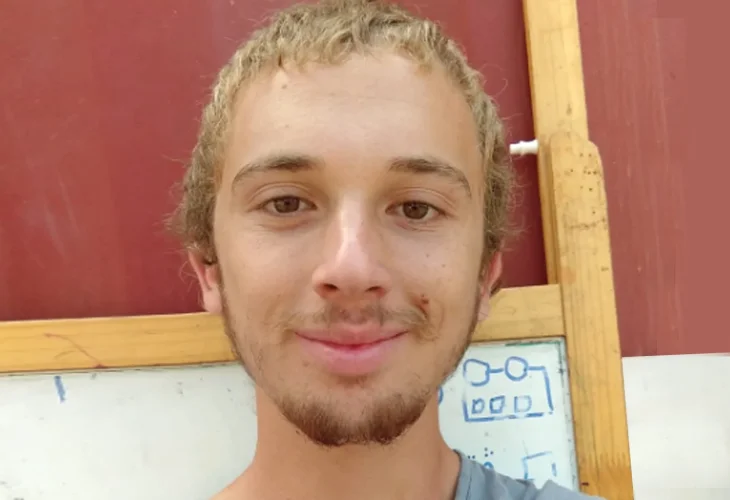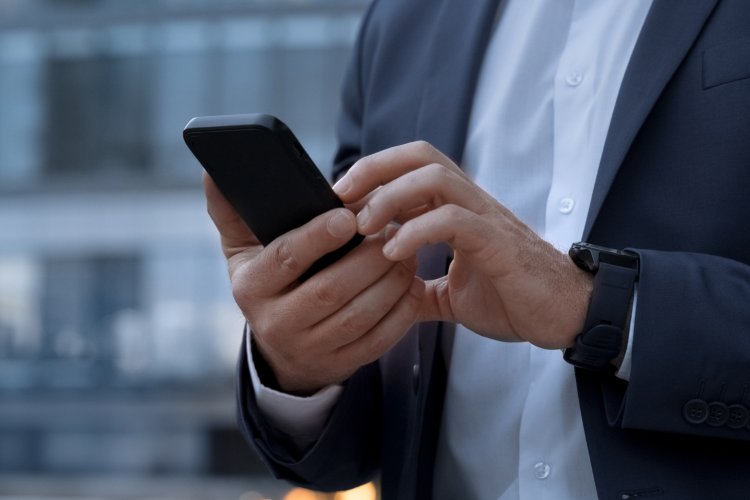"Now I'm Free and Happy": The Secular Teen Who Switched to a Kosher Phone
Discover why a secular teen abandons the smartphone for a kosher cell phone, his communication with friends, and how he responded to teachers who warned he couldn't pass exams. Ori Hordan from Kfar Vitkin shares his surprising story.
 Ori Hordan
Ori HordanIt was at a bus stop near Ra'anana a few weeks ago. Ori Hordan, an 18-year-old resident of Kfar Vitkin, was leaning against the stop, waiting patiently, when an embarrassed yeshiva student approached him with a request: "Can you check when the bus arrives for me?" Hordan immediately understood that the student wanted him to look it up on the Moovit app, yet, to the student's surprise, Hordan pulled out a small mobile device from his pocket with no internet connection. "This is the device I use," he showed the confused man, who pulled out an identical device bearing a kosher certification stamp. They both laughed. It turned out they both had the exact same device.
A Decision Out of Frustration
Talking with Hordan is fascinating. Here's a young man from a non-religious household who chose to carry a non-smartphone because he believes it's the right thing for him. "I know I'm unusual," he calmly states, "because over the years I've met quite a few people with a non-smart Nokia, but never someone like that who isn't ultra-Orthodox."
Where did this decision come from?
"I got my first mobile phone in sixth grade. Of course, it was a smartphone, with all the social networks and whatnot. I spent countless hours on it every day; it was part of me until COVID hit, and then I discovered that my standard phone usage was becoming more intense. It got to the point where one day I was surfing for six hours. I know that's not much compared to the average among Israeli teenagers, but it frustrated me greatly and made me think my day was wasted on nonsense. I felt I couldn't let it happen again, so I just disconnected and went without any device for a while. During the pandemic, I was by the sea for hours and didn't think much about what's going on elsewhere.
"After COVID, we returned to routine. I started 10th grade and entered the exam period, so I needed a device to communicate with the world, but I didn't want to be sucked into all the networks and groups, so I bought a basic Nokia that only had WhatsApp messaging. Shortly after, I realized even that was consuming too much time, so I got an even simpler Nokia without WhatsApp."
And how was the change?
"Amazing, real fun. Suddenly you have silence, and you don't hear message alerts all the time. You don't have to jump every time your friend gets a message, wondering 'maybe it's yours.' I was so content that I eventually ditched even that device and went around without any phone for a few months. I felt free and happy. There's no greater pleasure than that. But life didn't allow me to continue like that, and the necessity was great, so I returned to the dumbest cellular device possible — without WhatsApp, tiny and cute. It was a great period that lasted a year and a half, until the company stopped using antennas in Tel Aviv and Herzliya Pituah, where I had relatives. Seeing the device no longer worked, I switched to another kind of Nokia, still stupid and without WhatsApp, known in the Haredi community as 'kosher'."
Meanwhile, Hordan's life continued as usual. "I didn't feel my life was impacted in any way because I wasn't connected to all the groups and networks," he claims. "While some teachers talked to me and threatened that I wouldn't pass my exams, it turned out that wasn't accurate. I continued studying and preparing for the exams just like before. One day, my math teacher called to say there was an exam the next day. She explained she was calling because I might not know, and indeed, I didn't. But in the end, I scored a hundred on the test, so the gloomy predictions didn't really hold water. Besides, I have to admit, I never felt out of the loop. I always had friends updating me, and when I got to school, I caught up on the news and heard what's happening."
 (Photo: shutterstock)
(Photo: shutterstock)Stopping the Madness
How do your friends and family react to this?
"My friends think it's great and even find it cool and interesting. My mom struggled a bit initially because I'm less available, and she worries about me, but I try to call often, and over time she accepted it. Generally, it takes people a little time to understand that while you can't text me, I'm usually very reachable, even more than people with messaging apps, and you can just call me."
Don't you think you could be inconveniencing your surroundings by making them have to call you specifically?
"No, because just like my choice is to live this way, it's their choice whether they want to call me or not. I explain this to everyone around me, including those responsible for my national service these days. I told them this is how I choose to live, and the truth is, I think this issue is much less significant than many other things that affect my daily life. It's just a small, insignificant detail in the race of life."
Do you believe the path you've chosen for yourself could suit others as well?
"Absolutely yes. The situation today in the country and around the world is catastrophic. I see small children around me, two or three years old, sitting in strollers and browsing smartphones for fun. I recently visited India, and I saw kids living in homes that look like wrecks, wandering the streets dressed in rags, yet they still have smartphones in their hands, filming TikTok videos. It's completely crazy. I believe that just as the change occurred in me — out of a sense of saturation, people will come to realize they want to leave smart devices behind and not engage with them at all. It's a realization the religious community grasped long ago, but I think others will recognize it later and join the trend I'm happy to be part of every moment."

